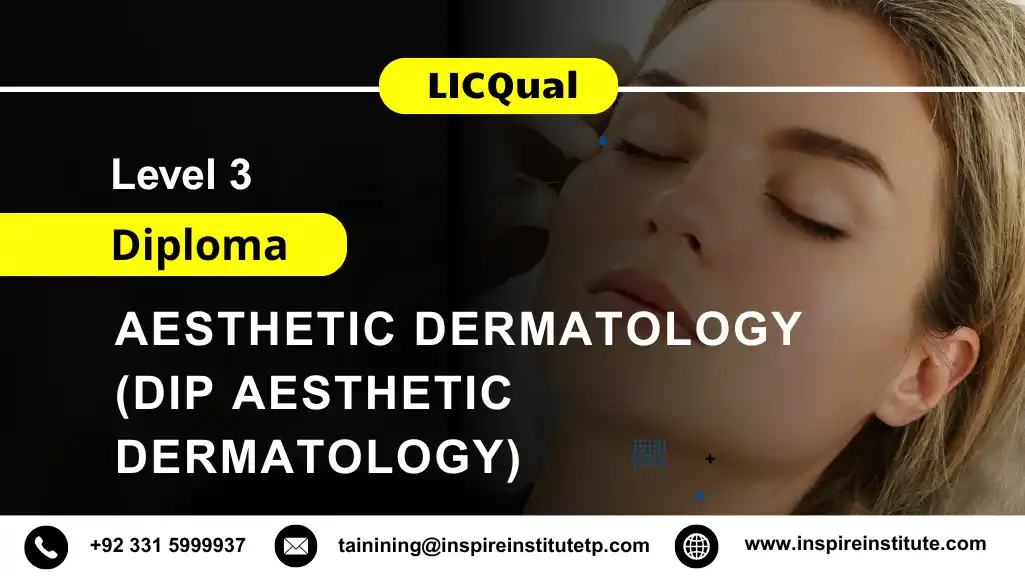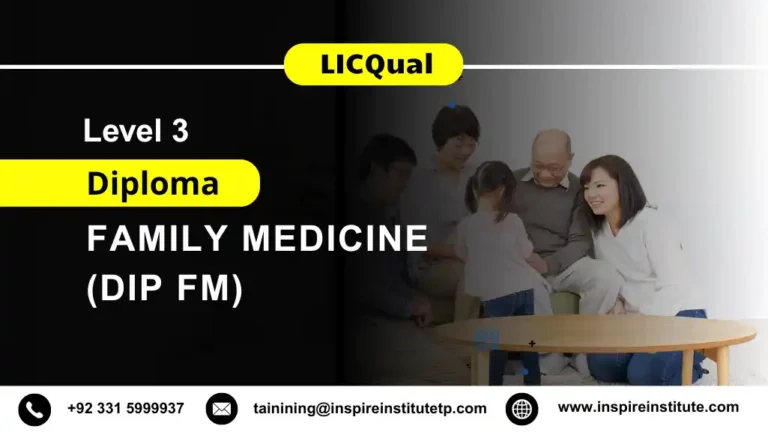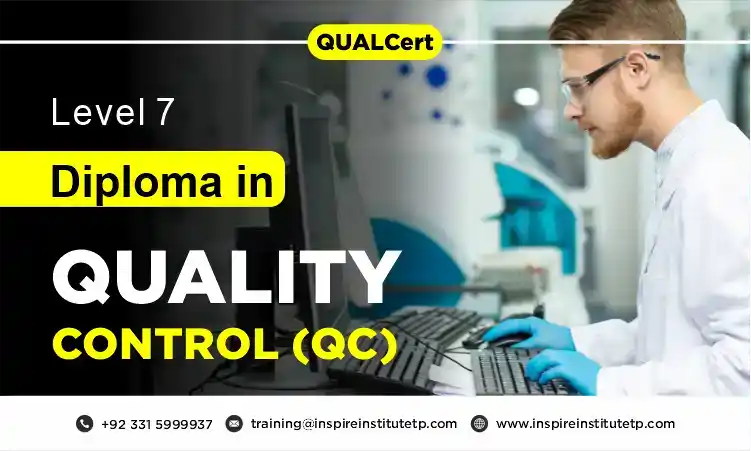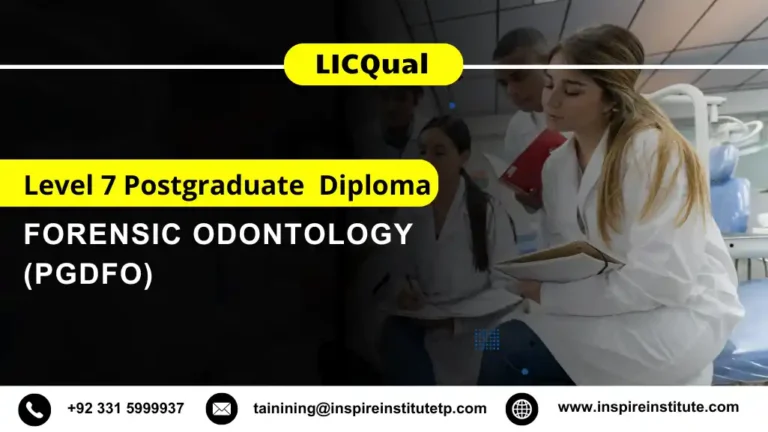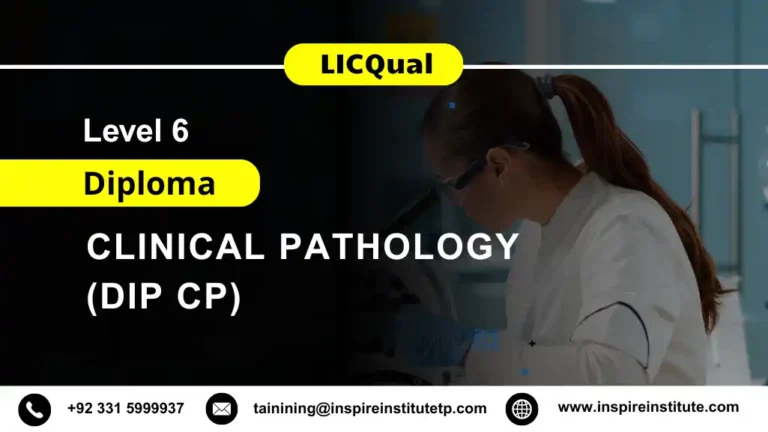LICQual Level 3 Diploma in Aesthetic Dermatology (Dip Aesthetic Dermatology)
The LICQual Level 3 Diploma in Aesthetic Dermatology (Dip Aesthetic Dermatology) is a comprehensive and industry-focused qualification designed for professionals seeking to excel in the rapidly growing field of aesthetic medicine and dermatology. With the increasing demand for non-invasive cosmetic treatments and advanced skin care procedures, this diploma equips learners with the essential knowledge and practical expertise to thrive in modern clinical and aesthetic environments.
This diploma aims to provide an in-depth understanding of skin anatomy, physiology, and common dermatological conditions. Learners will explore the latest advancements in aesthetic procedures, including chemical peels, dermal fillers, botulinum toxin applications, and laser treatments. The course scope ensures that students gain both theoretical knowledge and hands-on practical skills, enabling them to deliver safe, effective, and professional aesthetic treatments with confidence.
Enrolling in this LICQual Level 3 Diploma in Aesthetic Dermatology allows learners to develop advanced practical skills that are directly applicable in clinical settings. The program emphasizes safe treatment protocols, patient consultation techniques, and post-procedure care, ensuring a holistic approach to aesthetic dermatology. Students will also acquire essential skills in risk assessment, infection control, and ethical considerations, which are crucial for maintaining professional standards and client safety.
Why Choose this Qualification
The LICQual Level 3 Diploma in Aesthetic Dermatology (Dip Aesthetic Dermatology) is a leading qualification for professionals aspiring to excel in aesthetic medicine and cosmetic dermatology. With the growing global demand for non-surgical aesthetic treatments, this diploma offers learners a unique combination of theoretical knowledge, clinical skills, and practical experience.
Key Reasons to Choose this Qualification
Comprehensive Knowledge of Skin Science
- Gain a detailed understanding of skin anatomy, physiology, and dermatological conditions.
- Learn about skin types, disorders, and aging processes for accurate assessment.
- Understand the science behind aesthetic procedures and cosmetic products.
- Explore the latest developments in medical and cosmetic dermatology.
- Develop the ability to design personalized treatment plans based on scientific principles.
Advanced Practical Skills in Aesthetic Treatments
- Master non-surgical procedures such as chemical peels, dermal fillers, and botulinum toxin applications.
- Learn to operate aesthetic devices safely, including lasers and microdermabrasion equipment.
- Apply hands-on skills in skin analysis, treatment techniques, and post-procedure care.
- Develop competence in assessing client needs and delivering safe, effective treatments.
- Build confidence through supervised practical exercises and simulated scenarios.
Patient Consultation and Care Expertise
- Learn professional consultation techniques to assess client expectations and suitability.
- Develop skills in documenting client history and treatment plans accurately.
- Gain expertise in advising clients on pre- and post-treatment care.
- Understand patient safety protocols, hygiene, and infection control standards.
- Build trust and professionalism through effective communication skills.
Ethical and Legal Understanding
- Acquire knowledge of ethical practices in aesthetic dermatology.
- Understand legal responsibilities, professional codes, and regulatory requirements.
- Learn how to manage client confidentiality and consent processes.
- Develop awareness of safety compliance and risk management procedures.
- Apply ethical decision-making in clinical and aesthetic settings.
Career Advancement Opportunities
- Enhance employability in private aesthetic clinics, dermatology centers, and wellness facilities.
- Gain professional recognition with a respected Level 3 diploma.
- Open pathways to advanced training or specialist aesthetic qualifications.
- Increase potential for higher earnings and career progression.
- Stand out in the competitive field of cosmetic and medical dermatology.
Integration of Theory and Practice
- Combine academic knowledge with hands-on clinical experience.
- Apply theoretical principles to practical treatments for real-world proficiency.
- Develop critical thinking skills in treatment planning and problem-solving.
- Gain measurable outcomes in procedural competence and client satisfaction.
- Ensure readiness to perform treatments safely and independently in professional settings.
Focus on Safety and Risk Management
- Learn infection control, sterilization techniques, and hygiene protocols.
- Develop skills in risk assessment for various aesthetic procedures.
- Understand contraindications and safety precautions for patient care.
- Gain competence in emergency response procedures for aesthetic treatments.
- Ensure compliance with health and safety standards in clinical practice.
This LICQual Level 3 Diploma in Aesthetic Dermatology (Dip Aesthetic Dermatology) is the ideal qualification for professionals seeking a structured, measurable, and career-focused pathway into cosmetic and medical dermatology. By combining advanced knowledge, practical skills, patient care expertise, and ethical training, learners graduate fully equipped to excel in aesthetic dermatology and deliver high-quality, professional services.
Course Overview
LICQual UK Awarding Body
Average Completion Time:
4-12 Months
Study Units: 6 Units
Evidence & Assignment Based
Mandatory Units
Who Should Take This Course
The LICQual Level 3 Diploma in Aesthetic Dermatology (Dip Aesthetic Dermatology) is a professional qualification designed for individuals aiming to advance their careers in cosmetic dermatology and aesthetic medicine. With the rising demand for non-surgical treatments and advanced skin care procedures The program is suitable for a wide range of learners who want to enhance their expertise, deliver safe and effective treatments, and achieve measurable professional growth.
This Course is Suitable for
Beauty Therapists
- Develop advanced knowledge of skin anatomy and dermatological conditions.
- Learn to perform non-surgical aesthetic treatments such as chemical peels and dermal fillers.
- Gain practical skills in client assessment, consultation, and post-treatment care.
- Understand hygiene protocols, safety standards, and infection control.
- Enhance career prospects in private clinics, beauty centers, and wellness facilities.
Medical Professionals
- Expand expertise in cosmetic dermatology alongside existing medical qualifications.
- Acquire hands-on skills in advanced aesthetic procedures and equipment use.
- Learn patient consultation techniques, treatment planning, and risk assessment.
- Understand ethical and legal considerations in aesthetic practice.
- Improve patient outcomes through safe and effective non-surgical treatments.
Healthcare Practitioners
- Gain practical experience in delivering aesthetic dermatology treatments safely.
- Learn to assess skin conditions and recommend appropriate interventions.
- Develop confidence in using aesthetic devices, including lasers and microdermabrasion tools.
- Enhance understanding of patient care protocols, consent, and record-keeping.
- Strengthen professional credibility and expand career opportunities in dermatology clinics.
Individuals Seeking Career Change
- Acquire a recognized qualification in a rapidly growing field.
- Learn both theory and practical skills required for aesthetic dermatology.
- Gain measurable competencies that meet industry standards.
- Prepare for employment in clinics, medical spas, and wellness centers.
- Build a foundation for further advanced aesthetic courses and specialization.
Aspiring Aesthetic Practitioners
- Master non-surgical treatments, patient consultation, and clinical procedures.
- Develop skills in planning, executing, and reviewing aesthetic interventions.
- Learn risk management, contraindications, and safety protocols.
- Build confidence in delivering professional, high-quality client care.
- Achieve measurable outcomes in both theoretical knowledge and practical expertise.
Students in Beauty or Healthcare Programs
- Complement existing studies with advanced aesthetic dermatology knowledge.
- Gain early exposure to practical clinical procedures and consultation skills.
- Understand industry standards for hygiene, safety, and patient care.
- Learn to integrate theoretical concepts with real-world practice.
- Enhance employability and readiness for professional roles post-graduation.
Clinic Owners and Managers
- Upgrade staff skills and expand service offerings with accredited training.
- Learn to implement best practices, safety standards, and treatment protocols.
- Develop measurable strategies to improve client satisfaction and clinic performance.
- Gain insights into the latest trends and technologies in aesthetic dermatology.
- Strengthen professional credibility and business growth potential.
This LICQual Level 3 Diploma in Aesthetic Dermatology (Dip Aesthetic Dermatology) is ideal for anyone seeking a structured, measurable, and career-focused pathway into cosmetic and medical dermatology. By enrolling, learners gain both theoretical knowledge and practical expertise, ensuring they are fully equipped to deliver safe, professional, and high-quality aesthetic services while advancing their careers.
Course Benefits
The LICQual Level 3 Diploma in Aesthetic Dermatology (Dip Aesthetic Dermatology) offers an extensive learning experience for professionals aiming to develop expertise in aesthetic medicine, cosmetic dermatology, and advanced skin treatments. This UK-accredited qualification bridges theoretical knowledge with practical application, equipping learners to understand, analyze, and deliver a variety of non-surgical aesthetic procedures. Designed as an assignment-based programme, it provides flexibility, accessibility, and academic depth—ideal for beauty therapists, healthcare practitioners, and medical professionals seeking to enhance their skills and career prospects in the aesthetic industry.
Key Benefits of the Course:
Specialist Knowledge
- Gain an in-depth understanding of skin anatomy, physiology, and dermatological conditions.
- Explore advanced aesthetic procedures including chemical peels, dermal fillers, and botulinum toxin applications.
- Understand the science behind skin rejuvenation, anti-aging treatments, and cosmetic technologies.
- Learn ethical practices, legal responsibilities, and regulatory standards in aesthetic dermatology.
- Develop the ability to design personalized treatment plans based on client needs and clinical principles.
Practical Application
- Develop hands-on skills in performing non-surgical aesthetic procedures safely and effectively.
- Gain practical experience in patient consultation, skin assessment, and treatment planning.
- Learn to operate aesthetic devices such as lasers, microdermabrasion equipment, and advanced skin care tools.
- Apply theoretical knowledge to real-world scenarios through case studies and assignments.
- Build confidence in delivering treatments while ensuring client safety and satisfaction.
Recognised Qualification
- Earn a UK-recognised diploma that validates your expertise in aesthetic dermatology.
- Enhance professional credibility and career opportunities in private clinics, dermatology centers, and wellness facilities.
- Gain international recognition, opening doors to global roles in cosmetic and medical aesthetics.
- Achieve measurable competencies aligned with industry standards for non-surgical treatments.
- Strengthen qualifications for progression to advanced aesthetic courses or professional specializations.
Flexible Learning Pathway
- Study at your own pace through the assignment-based format, accommodating work and personal commitments.
- Access structured modules and guided assessments designed for steady professional growth.
- Ideal for beauty therapists, healthcare practitioners, and career changers seeking specialized skills.
- Combine theoretical learning with practical exercises without disrupting professional schedules.
- Benefit from a flexible, self-paced structure that encourages continuous development and mastery.
Evidence-Based Training
- Learn the latest scientific developments in dermatology and non-surgical aesthetic treatments.
- Understand treatment methodologies supported by research and clinical best practices.
- Develop the ability to apply evidence-based approaches in client care and procedure planning.
- Gain skills in evaluating treatment outcomes and adapting protocols based on patient needs.
- Ensure proficiency in using modern cosmetic technologies that meet international standards.
Career Development
- Open pathways to roles in private aesthetic clinics, dermatology centers, and wellness facilities.
- Enhance employability with a diploma that demonstrates measurable expertise in aesthetic dermatology.
- Gain the skills and credentials needed to pursue specialist aesthetic treatments or advanced training.
- Increase potential for higher earnings, professional recognition, and career advancement.
- Stand out in a competitive field with industry-relevant knowledge and practical competencies.
Enhanced Client Care and Treatment Outcomes
- Develop the ability to provide safe, ethical, and effective non-surgical treatments.
- Improve patient consultation, communication, and care planning skills.
- Apply practical expertise to enhance client satisfaction and treatment success.
- Understand contraindications, risk management, and post-treatment protocols.
- Contribute to improved health and aesthetic outcomes for diverse client populations.
Professional Growth
- Cultivate analytical, critical thinking, and problem-solving skills for clinical settings.
- Enhance professionalism, ethical awareness, and scientific reasoning in aesthetic practice.
- Build confidence to work independently or as part of a multidisciplinary team.
- Develop competence in patient management, treatment evaluation, and outcome documentation.
- Prepare for leadership roles in cosmetic dermatology and non-surgical aesthetic practice.
The LICQual Level 3 Diploma in Aesthetic Dermatology (Dip Aesthetic Dermatology) empowers learners with the scientific knowledge, technical skills, and professional competence needed to excel in the dynamic field of aesthetic dermatology. Combining academic rigor with practical application, this UK-recognised qualification equips professionals to deliver safe, innovative, and high-quality treatments while advancing their careers in the cosmetic and medical aesthetics industry.and thoracic health initiatives.
Eligibility Criteria
The LICQual Level 3 Diploma in Aesthetic Dermatology (Dip Aesthetic Dermatology) is designed for professionals and aspiring practitioners seeking to build a career in cosmetic and medical dermatology. To ensure learners succeed in both theoretical and practical components, certain entry requirements must be met. These standards maintain professional quality and maximize learning outcomes.
Age Requirements
Applicants must be at least 18 years old at the time of enrolment.
Ensures learners have the maturity and responsibility needed for clinical and aesthetic practice.
Younger applicants may be considered if they demonstrate relevant experience and professional readiness.
Complies with UK regulations for professional and healthcare training programs.
Educational Requirements
Minimum of a high school diploma or equivalent qualification required.
Prior study in health, beauty therapy, nursing, or related fields is highly recommended.
Foundational knowledge of human anatomy and physiology supports course success.
Completion of entry-level aesthetic or beauty therapy courses, such as the LICQual Level 2 Diploma in Beauty Therapy, is advantageous.
Professional Experience
Previous experience in healthcare, beauty therapy, or clinical settings is preferred but not mandatory.
Experience in client consultation, skin treatments, or wellness services is beneficial.
Professionals seeking career advancement in aesthetic dermatology will find the course directly relevant.
Practical experience ensures learners can apply theoretical knowledge effectively.
English Language Proficiency
Learners must demonstrate sufficient English for comprehension and communication.
Written and spoken English skills are essential for completing assignments, consultations, and practical assessments.
Non-native speakers may need to provide evidence of proficiency via IELTS, TOEFL, or equivalent.
Strong communication skills ensure professional client care and safe practice during treatments.
The Qualification Process
LICQual Level 3 Diploma in Aesthetic Dermatology (Dip Aesthetic Dermatology) follows a structured pathway to ensure learners gain comprehensive knowledge, practical skills, and professional competence in community oral healthcare.
Step 1: Self-Assessment
Learners review the entry requirements to confirm eligibility. Candidates with a background in dentistry, oral health, or public health are encouraged to apply.
Step 2: Registration
Complete the registration process by submitting required documents such as proof of qualifications, a valid ID, and payment of enrollment fees.
Step 3: Induction
An induction session is conducted to:
- Verify learner eligibility and documentation.
- Introduce study materials, learning outcomes, and assessment procedures.
Step 4: Learning and Evidence Submission
Learners complete assignments, case studies, and practical exercises demonstrating competence in public health dentistry, community oral health assessment, preventive strategies, and program planning.
Step 5: Feedback and Revision
Assessors review submitted evidence and provide constructive feedback. Learners can revise and resubmit work to meet all required standards.
Step 6: Competence Validation
Final submissions are evaluated to confirm that learners have met all theoretical and practical learning outcomes.
Step 7: Internal Quality Assurance (IQA)
The IQA team reviews the assessment process to ensure accuracy, fairness, and compliance with international standards.
Step 8: External Verification (EQA)
External verifiers validate the authenticity and quality of learner achievements.
Step 9: Certification
Upon successful verification, learners are awarded LICQual Level 3 Diploma in Aesthetic Dermatology (Dip Aesthetic Dermatology), demonstrating advanced proficiency in community oral healthcare and preparing them for professional growth in dental public health, preventive dentistry, and healthcare policy.

